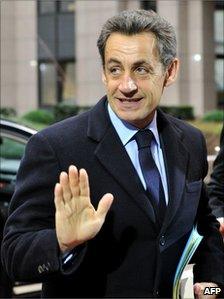EU leaders tackle energy as trillion-euro bill looms
- Published
Europe builds joined-up energy future
A one-day EU summit on energy and innovation is being held in Brussels as Europe faces a heavy infrastructure bill over the next decade.
The European Commission estimates that EU countries will have to spend 1tn euros (£850bn; $1.4tn) on energy infrastructure in that period.
Leaders are also likely to discuss eurozone debt and the Egyptian crisis.
There is a debate over whether funding for energy projects, external should come mainly from the private sector or the EU.
The goal is to create a single energy market in Europe, European Council President Herman Van Rompuy said.
Egypt under scrutiny
The AFP news agency says it has obtained an early copy of a statement on Egypt to be put forward by the leaders at the European Council talks.
In it, the leaders condemn violence "in the strongest terms" and call for an "expeditious and orderly transition" of power.
As the summit got under way, UK Prime Minister David Cameron warned that "if we see on the streets of Cairo today state-sponsored violence or the hiring of thugs to beat up protesters then Egypt and its regime would lose any remaining credibility and support it has in the eyes of the watching world, including Britain".
How much attention the summit will devote to Egypt will probably depend on how events unfold there throughout the day, the BBC's Chris Morris reports from Brussels.
Asked if the EU would urge embattled President Hosni Mubarak to step down, EU foreign policy chief Baroness Ashton said:
"We've been very clear in everything that we've said, that it's for the Egyptian people and the Egyptian government to move forward together."
Lender confidence

France's President Sarkozy is working closely with Germany on the euro
The leaders will also discuss the financial strains in the 17-nation eurozone, amid hopes in the financial markets that they are making progress, BBC economics correspondent Andrew Walker reports.
In the last few weeks, interest rates on the debts of governments in difficulty, such as Spain and Portugal, have come down.
That is a sign that lenders are more confident that they will be repaid.
The governments of countries using the euro are discussing how to increase the amount they can lend to countries in difficulty - the European Financial Stability Facility agreed last May.
They are also planning more intrusive surveillance of countries' budgets, with the aim of keeping debts under better control in the future.
They are not likely to settle these issues at this summit, but are aiming for a deal in March, our correspondent says.
"We want to increase our competitiveness and grow closer together within the euro group and also invite other countries to take part," German Chancellor Angela Merkel said ahead of the summit.
Belgian Prime Minister Yves Leterme said he was "absolutely not in agreement" with a French-German plan to harmonise eurozone governance that includes a bid to do away with index-linked wage rises.
It is still unclear whether other countries, in addition to Greece and Ireland, will need rescue loans.
Portugal is widely seen as the next country that might need help, followed by Spain.
Increasing the effectiveness of the eurozone's rescue facilities may reinforce confidence in the markets and make it less likely that further rescues will be needed.
Some analysts have warned that if the forthcoming summits do not produce an agreement then other countries are more likely to face new financial stresses.
- Published4 February 2011
- Published4 February 2011
- Published1 February 2011